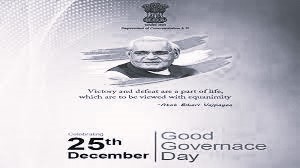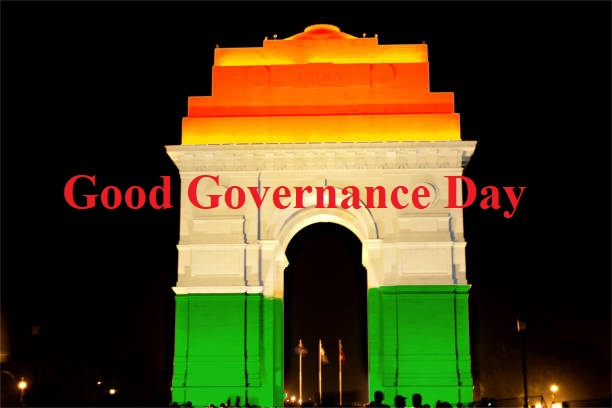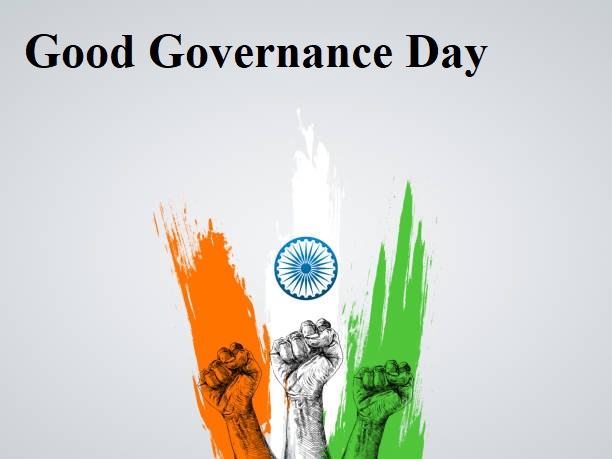Good Governance Day 2023
Candidates should thoroughly research Good Governance Day 2023 in order to be well-prepared for the competitive exams. It is a significant day in December. December 25, 2023, is designated as Good Governance Day. The nation honours the birth anniversary of Bharat Ratna Atal Bihari Vajpayee, the former prime minister, on this day. The government has declared Good Governance Day to be a working day as a result of this concept. This day is observed in conjunction with the Christmas season.

Participation in Good Governance: Eight Principles
Participation:
Individuals ought to have the ability to express their opinions through representatives or organisations, regardless of gender.
Free speech and idea sharing should be allowed for all.
The supremacy of law:
Everyone is expected to abide by the rules, particularly those pertaining to people's rights.
It's like saying the powerful can do whatever they want if there are no rules.
Centred on consensus:
Making decisions should aim to satisfy everyone, if not entirely.
Finding a middle ground between divergent viewpoints is the goal.
Fairness and Inclusivity:
Making sure everyone has an equal opportunity is a sign of good governance.
Everybody ought to have the chance to improve their lives.

Efficiency and Effectiveness:
Groups and things should act in the best interests of the community.
In order to get the most done, resources should be used wisely.
Responsibility:
Everyone should answer to the people, including the government and businesses.
People ought to be aware of the situation.
Openness:
All people should be able to see and understand the information easily.
Access to free media and information is also a requirement for this.
Adaptability:
Items and organisations ought to assist everyone in a timely manner.
When necessary, they should listen and take action.
History
On September 10, 2023, people celebrate Good Governance Day in honour of former prime minister Atal Bihari Vajpayee. The nation's highest civilian award, the Bharat Ratna, was given to former prime minister Atal Bihari Vajpayee and Pandit Madan Mohan Malaviya on December 23, 2014. The day after, December 25, was designated as Good Governance Day by recently elected Prime Minister Narendra Modi. Atal Bihari Vajpayee served as prime minister of India three times. His first term ended after just 13 days in 1996. He served his second term from 1999 to 2004; he had begun in March 1998 and had been there for thirteen months in total. His first appearance in the Rajya Sabha was in 1962. He was victorious in seven Lok Sabha elections. The highest civilian award in India, the Bharat Ratna, was given to Mr. Vajpayee in 2015.

Atal Bihari Vajpayee: who was he?
On December 25, 1924, Atal Bihari Vajpayee was born in Gwalior, a former princely state that is now a part of Madhya Pradesh. During the 1942 Quit India Movement, which accelerated the end of British colonial rule, he entered national politics. Vajpayee began his career as a journalist in 1947, working for Deendayal Upadhyaya newspapers such as the Hindi weekly Panchjanya, the monthly Rashtradharma, and the dailies Veer Arjun and Swadesh. Later, in 1951, Vajpayee joined the Bharatiya Jana Sangh after being inspired by Syama Prasad Mookerjee. He served as India's prime minister from 1996 to 1999, when he was re-elected.

Importance
The purpose of Good Governance Day 2023 is to inform the nation's citizens and students about their obligations to uphold the rights and duties of their government. To commemorate Good Governance Day in 2023, there will be live programmes, seminars, orientations, dialogues, quizzes, and other events. The government is reminded of its duties on Good Governance Day 2023, and it is expected to be impartial, open, and development-focused. The Good Government Index (GGI), created by the Ministry of Personnel, Public Grievances, and Pensions, rates how well the country is run. It evaluates the outcomes of various state and local government initiatives. Transparency in governance is greatly advanced by the Right to Information Act of 2005. Every locality will implement a national e-government strategy to enable the general public to easily and affordably access all government services. For the average person, it will be more efficient and transparent.
















